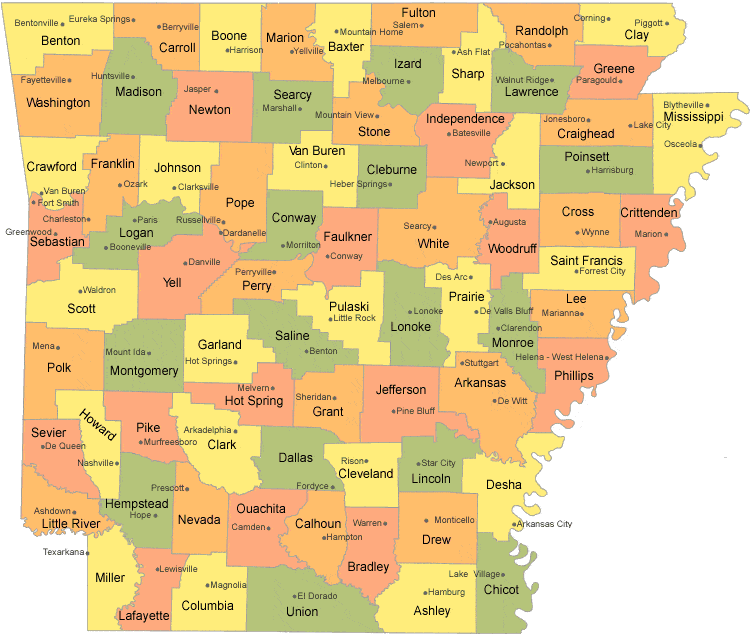So, you want to learn more about Arkansas Genealogy? Perhaps you have tracked an ancestor down to the Natural State and have hit a wall, or maybe you know who your ancestor is and want to learn more about the local history so that you can understand what they were living through. Whatever the reason, this is a great place to start.

Jump to:
Arkansas Genealogy: State History
Arkansas is located in the southern portion of the United States and is bordered by the Mississippi River. The state entered the union on June 15, 1836, as a slave state, seceded in 1861, and became part of the Confederate States of America. It would serve as the location for many battles throughout the Civil War. Post-Civil War, the state went through reconstruction. It became a destination for immigrants looking to find work.
Arkansas Genealogy: Guide to Arkansas Counties
Here is a list of all the counties in Arkansas. If you know the county your ancestor was in, then click the link, and it will take you to a page full of resources in that county. This is incredibly valuable in genealogical research. The more that you can isolate an area, the easier it is to track down your ancestor. Most likely, there are still family members that live in the area that would have knowledge of your ancestors, the cemeteries will hold valuable information, and the local libraries and genealogical societies can point you in the right direction.
ARKANSAS ∣ ASHLEY ∣ BAXTER ∣ BENTON ∣ BOONE ∣ BRADLEY ∣ CALHOUN ∣ CARROLL ∣ CHICOT ∣ CLARK ∣ CLAY ∣ CLEBURNE ∣ CLEVELAND ∣ COLUMBIA ∣ CONWAY ∣ CRAIGHEAD ∣ CRAWFORD ∣ CRITTENDEN ∣ CROSS ∣ DALLAS ∣ DESHA ∣ DREW ∣ FAULKNER ∣ FRANKLIN ∣ FULTON ∣ GARLAND ∣ GRANT ∣ GREENE ∣ HEMPSTEAD ∣ HOT SPRINGS ∣ HOWARD ∣ INDEPENDENCE ∣ IZARD ∣ JACKSON ∣ JEFFERSON ∣ JOHNSON ∣ LAFAYETTE ∣ LAWRENCE ∣ LEE ∣ LINCOLN ∣ LITTLE RIVER ∣ LOGAN ∣ LONOKE ∣ MADISON ∣ MARION ∣ MILLER ∣ MISSISSIPPI ∣ MONROE ∣ MONTGOMERY ∣ NEVADA ∣ NEWTON ∣ OUACHITA ∣ PERRY ∣ PHILLIPS ∣ PIKE ∣ POINSETT ∣ POLK ∣ POPE ∣ PRAIRIE ∣ PULASKI ∣ RANDOLPH ∣ ST. FRANCIS ∣ SALINE ∣ SCOTT ∣ SEARCY ∣ SEBASTIAN ∣ SEVIER ∣ SHARP ∣ STONE ∣ UNION ∣ VAN BUREN ∣ WASHINGTON ∣ WHITE ∣ WOODRUFF ∣ YELL
Arkansas Genealogy: Research Databases
Researching Arkansas genealogy is not that difficult. The state has a history that dates back to before the Civil War, and due to its location on the Mississippi River, it was attractive to immigrants and migrants. Freed slaves also set up residence in Arkansas. Tracking down your Arkansas ancestor should not be hard since many of their archives are well-preserved.
However, like any research, you need to know where to start. Starting in Arkansas is not much different than starting in any other state. You need to begin by looking for any obvious event that will produce a record. This can be Birth, Marriage, Divorce, Death, Naturalization, Military, or Immigration records. Every ancestor is different with their own stories. Each of those stories may produce different records. To get started and lay a foundation for your Arkansas ancestor, look at these quick links:
- Birth Records
- Death Index (1914 - 1950)
- Marriage Index (1837 - 1957)
- Marriage Index (1851 - 1900)
- Arkansas Divorce Index (1923 - 1939)
- Naturalization Records (1907 - 1968)
- Arkansas Military Records
- Arkansas Newspapers
Arkansas Genealogy: Advanced Research Techniques
If you want to pursue your Arkansas ancestor further after finding them in census reports or vital records, then the next step would be to contact local archives. Here is a list of places you should check out if you want to dive deeper:
- County Clerk’s Office: Contacting the county clerk can help you find some land records, court documents, and other interesting documents that will give you a deeper look into your ancestor’s life.
- Local Library: What were the newspapers during that time period? Most libraries have microfilm that will allow you to read what was going on during your ancestor’s life. Many libraries also have obituary collections.
- Local Genealogical Societies: Most counties have their own historical society, and many cities also have genealogical societies. It is quite possible that someone has come before you and done much of the research and has wrote it down. If that is the case, then a local genealogical society would have that document.
- Local Cemeteries: Finding the grave of your ancestor can also give additional clues.
- Local Civil War Re-enactment Groups: Ohio was a major contributor to the Civil War, and throughout the state has many re-enactment groups that have excellent records of those who fought in various units. If you have an ancestor who fought in the Civil War and you know what unit they were in, then it would be beneficial to see if you can locate a re-enactment group for that unit.
